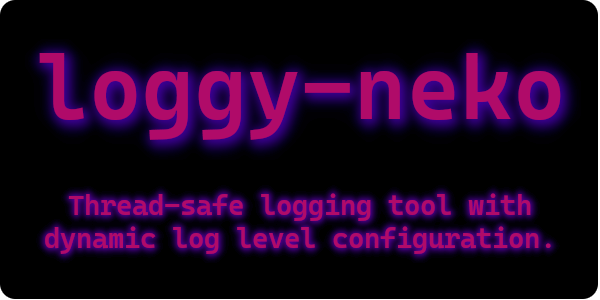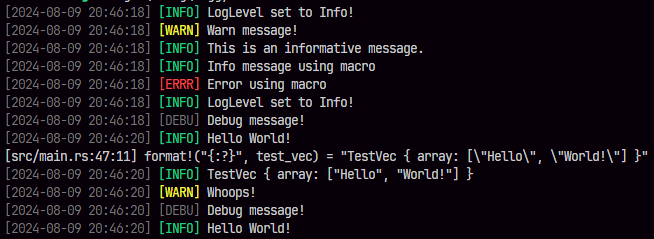2 releases
| 0.1.2 | Aug 9, 2024 |
|---|---|
| 0.1.1 | Jun 19, 2024 |
#920 in Debugging
110KB
105 lines

Simple thread-safe logging tool with dynamic log level configuration.
Logging works in an hierarchy from Info > Warn > Error. If the log level is set to one of these only self and lower would log. Example:
LogLevel::Info = Info, Warn, Error
LogLevel::Warn = Warn, Error
LogLevel::Error = Error
You can also use both info/warn/error() and log(LogLevel::Level, message) for logging depending on your preference
Quickstart
use loggy_neko::prelude::*;
fn main() {
info!("Hello World!");
}
Example usage
use loggy::{LogLevel, LOGGER};
#[derive(Debug)]
struct TestVec {
array: Vec<String>,
}
fn main() {
// * Standard use
LOGGER.set_log_level(LogLevel::Error);
LOGGER.info("Info message that wont display!");
LOGGER.set_log_level(LogLevel::Info);
LOGGER.info("LogLevel set to Info!");
LOGGER.warn("Warn message!");
LOGGER.debug("Debug message!");
// * Or using macros
info!("Info message using macro");
LOGGER.set_log_level(LogLevel::Error);
LOGGER.info("LogLevel set to Error!");
warn!("Warn using macro that wont display!");
error!("Error using macro");
LOGGER.set_log_level(LogLevel::Info);
LOGGER.info("LogLevel set to Info!");
info!("Hello World!");
let test_vec = TestVec {
array: vec!["Hello".to_string(), "World!".to_string()],
};
info!(dbg!(format!("{:?}", test_vec).as_str()));
warn!("Whoops!");
debug!("Debug message via macro!");
info!("Hello World!");
}
Outputs:

Roadmap
-
More configs: Time style, custom colors and which items to display
-
Display which function ran and at which line.
Dependencies
~1–7.5MB
~52K SLoC